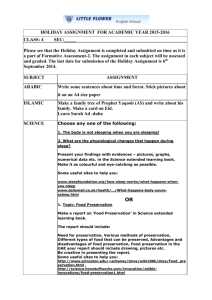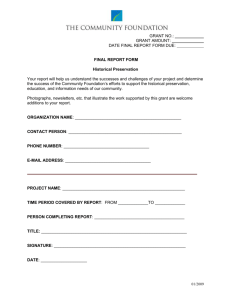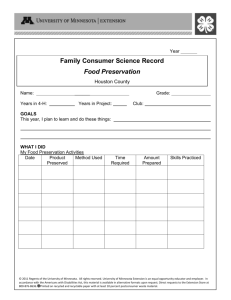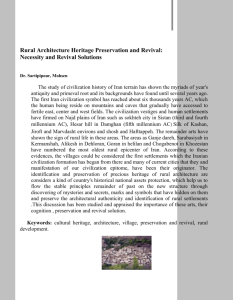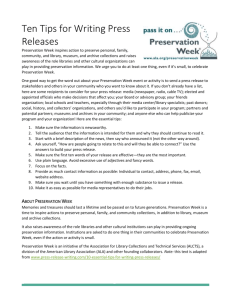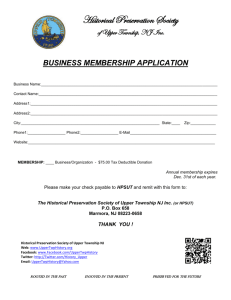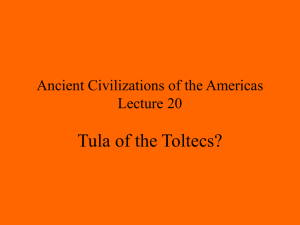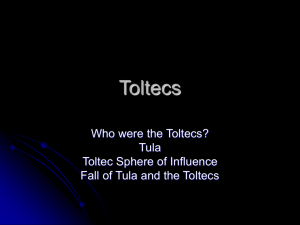2nd GP AG T.H.E Food Preservation Food Spoilage Causes and
advertisement
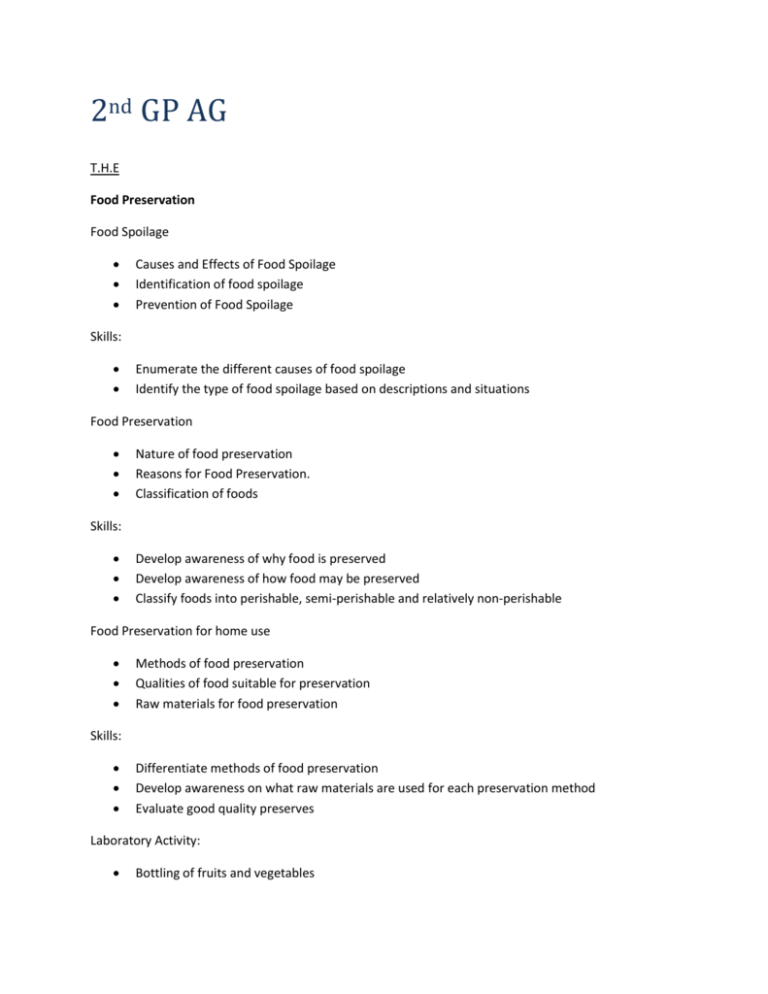
2nd GP AG T.H.E Food Preservation Food Spoilage Causes and Effects of Food Spoilage Identification of food spoilage Prevention of Food Spoilage Skills: Enumerate the different causes of food spoilage Identify the type of food spoilage based on descriptions and situations Food Preservation Nature of food preservation Reasons for Food Preservation. Classification of foods Skills: Develop awareness of why food is preserved Develop awareness of how food may be preserved Classify foods into perishable, semi-perishable and relatively non-perishable Food Preservation for home use Methods of food preservation Qualities of food suitable for preservation Raw materials for food preservation Skills: Differentiate methods of food preservation Develop awareness on what raw materials are used for each preservation method Evaluate good quality preserves Laboratory Activity: Bottling of fruits and vegetables Skills: Proper sanitation of bottles Correct procedures in bottling of fruits and vegetables Laboratory Activity: Meat Processing/Preservation Skills: Preserve meat products Cook preserved meat products Apply correct table setting and service Evaluation of products Chemistry Skills: Apply the octet rule in understanding the formation of chemical bonds. Illustrate chemical bonding with the use of Lewis symbols and structures Derive the chemical formula of inorganic compounds. Classify inorganic compounds as ionic, covalent, acids and bases. Apply the mole concept in computing for the number of particles, mass, and volume of chemical substances. Solve problems applying the basic mole concept. Write chemical equations using proper notations and symbols. Balance chemical equations using whole number coefficients. Topics: Chemical Bonding: Ionic and Covalent Bond Molecular Geometry Chemical Formula of Inorganic Compounds Nomenclature of Inorganic Compounds The Chemical Equation The Mole Concept Computer Skills: Discuss selection control structure, its features and applications. Apply logical and relational operators with conditional statements in programming. Apply flowcharting in problem solving. Topics: Relational Operators o o o o o o o o o o Simple Relational Operators Equal to Less than Greater than Compound Relational Operators Not equal to Less than or equal to Greater than or equal to Logical Operators NOT AND OR XOR Truth Tables Basic Concepts of Flowchart in Selection Control Structures o o o o Classifications and Features Single Alternative Double Alternative Multiple Alternatives Drills and Exercises Conditional Statements in Visual Basic o o o o o o Classifications and Features Single Alternative If… Then If… Then… End If Double Alternative If… Then… Else Applying Logical Operators NOT operator AND operator OR operator Combining Logical Operators o Drills and Exercises Multiple Alternatives If… Then… Else If Select Case Drills and Exercises Asian History Pillars of Ancient Civilizations o o o o o o o o o o What is a Civilization? Elements of a Civilization Importance of a Civilized living Civilization in the Fertile Crescent Origin of the Civilization in Mesopotamia Legacy of the Civilization in Fertile Crescent Ancient China Huang Ho river-valley Chinese Dynasties Indus River-Valley Civilizations Mohenjo-Daro and Harappa Maurya and Gupta Empires Spread of Islam in India Mughal Invasion of India Civilization in other Asian nations: o o o Japanese Civilization Korean Civilization Southeast Asian Kingdoms Khmer Empire Ayutthaya Empire Srivijaya and Majapahit Empires Special Topic for Second Grading Period Health Topics: Importance of Studying Ancient History Factors that Influence Drug Use Alcohol influence Marijuana Depressants and Hallucinogens Inhalants and Narcotics Stimulants and Tranquilizers Skills: Being aware of the factors that drug use and dependence Classifying different drugs Identifying positive and negative effects Distinguishing between the right and wrong use of drugs Applying appropriate first aid for each type of drug Using measures to prevent addiction Music Topics: East Asian Music Chinese Music Korean Music Japanese Music Skills: Listening intelligently Reading and analyzing of notes and scales Singing accurately Performing rhythmic patterns on improvised instruments South and Southeast Asian Music Indian Music Thai Music Skills: Listening intelligently Singing accurately in pitch and rhythm Performing in an ensemble Reading and analyzing notes and forms Analyzing musical traditional and musical forms P.E Topics: Basketball o o o Review of the history Facilities and Equipment Basic Skills Review on dribbling Passing Shooting Rules of the Game Dance Aerobics o o o o o History Types of Dance aerobics Variations Low impact exercise High impact exercise Step aerobics Water aerobics Low-high impact exercise Basic skills and dance steps Tae-bo o o o o o History Basic steps Kicks Punches Combination of kicks and punches Weaving Bobbing Routine presentations Sports fest Skills: Apply basic skills in basketball Show teamwork and camaraderie in playing the basketball Execution of fitness dances such as aerobics and tae-bo Show creativity in making routine presentations Apply proper posture and movements in performing the dance routine. Application of skills learned in the sports fest, objective evaluation of the sports fest Geometry Skills: Compare sides and angles of one or more triangles Apply properties of inequalities of real numbers Prove and apply properties of parallel lines Illustrate geometric figures Identify and apply the properties of polygons Solve problems Topics: Theorems on the Isosceles Triangle and on the Perpendicular Bisector of a Segment Inequalities for Real Numbers, Segments, and Angles Inequalities in Triangles Properties of Parallel Lines Proving Parallel Lines Polygons, Quadrilaterals, Parallelograms and Parallel Lines Special Parallelograms and the Isosceles Trapezoid Angle Measures and Areas of Polygons Theorems on Right Triangle Trigonometry Skills: o o Solve right triangles Solve oblique triangles Law of Sine Law of Cosine Apply concepts learned in solving routine and non-routine word problems Define vectors and its applications Utilize the scientific calculator effectively Topics: o Right triangle trigonometry Applications in routine and non routine word problems Oblique triangle trigonometry Bearing and Vector Project: Math Investigation in Trigonometry (a group research and study for the application for trigonometry in other industries) Introduction: October 2011 Submission: December 6 , 2011 Filipino MATATALINGHAGANG PAHAYAG: Kahulugan at Mga Halimbawa Pagsasalita: Pagbabahagi ng Kaisipan Pasulat: Pagbibigay ng Halimbawa ng mga idyoma TAYUTAY: Kahulugan, Uri at Mga Halimbawa Pagsasalita: Pagbabahagi ng Kaisipan Pasulat: Pagbibigay ng Halimbawa ng mga idyoma “Pag-ibig sa Tinubuang Lupa” TULA: Kahulugan,Kahalagahan at Mga Elemento Pakikinig: Pakikinig ng isang Tula Pagsulat: Pagsusuri ng Tula Pagsasalita: Pagbabahagi ng Pagsusuri TULA: Mga Uri Pakikinig: Tula Pagsulat: Pagsusuri ng Tula Pagsasalita: Pagbabahagi ng Pagsusuri TULA: Pagsulat Pagsulat: Paglikha ng Tula Gawain sa pagbasa ng Florante at Laura (Aralin 15 – 21) BALAGTASAN: Kahulugan,Kasaysayan at Mga Uri Pakikinig: Isang Halimbawa ng Pagtatalo Pagsulat: Pagbuo ng Reaksyon BALAGTASAN: Pagsasagawa Pagsasalita: Pagsasagawa ng Balagtasan Gawain sa pagbasa ng Florante at Laura (Aralin 22 – 28) “Aklasan” Pagkilala ng Pagpapahayag/Paglalahad/Pangangatwiran Pakikinig: Pakikinig ng isang Balita / Artikulo Pagsulat: Pagbuo ng Kaisipan “Ang Pambawi” DEBATE: Kahulugan Pakikinig: Isang halimbawa ng debate Pagdedebate Pagsasalita: Pagpapalitan ng opiyon English Listening Listening to Directions/Instructions Panchatantra Speaking Speech Choir (with individual rating) Impromptu Speech Grammar Focus and Language Skills Writing Active and Passive Voice (transforming) Verb Tenses Creative Writing: Fable (November 9-11) Indian Literature o o o o o o Panchatantra The Lion Makers The Foolish Lion and the Clever Rabbit Ramayana Mahabharata The Tale of Savitri Imagery and Symbolism Three Indian Poets: Bhartrihari, Kalidasa, and Rabindranath Tagore Fiction vs. Non-fiction Cabuliwalah by Rabindranath Tagore The Story of a Saint by A.M. Rosenthal Project Speech Choir (Class Project) (September) Journalism Topics: Plagiarism (1 hour) Systems of Documentation (2 hours) The Opinion-Editorial Section and the Importance of Research (1 hour) The Structure of the Opinion Article (1 hour) Choosing Editorial Topics and Drafting the Editorial (1 hour) Library Research (1 hour) Online Research (1 hour) Conducting Surveys (2 hours) Writing the Editorial (3 hours) Presentation and Peer Critiquing of Editorials (3 hours) The Editorial Cartoon (1 hour) Drawing the Editorial Cartoon (1 hour) Editorial Cartoon Presentation and Critiquing (2 hours) Requirements: Submission of Editorials – October 17-21, 2011 Presentation of Editorials – October 24-28, 2011 Submission of Editorial Cartoons – November 28-December 2, 2011 CL “COME AND SEE”/ “IF YOU WANT TO BE MY DISCIPLES, CARRY YOUR CROSS AND FOLLOW ME” Integration of Peace Education September 21, 2010 – International Day of Peace Oct. 2, 2011 – International Day of Non Violence Topics: o o o Jesus and His three-fold mission Jesus as a prophet Jesus as a priest Jesus as a king-servant Jesus’ words Jesus’ deeds Preparation and Celebration of the Sacrament of Confirmation Jesus’ New Commandment Jesus’ Passion Outreach preparation Outreach Evaluation Skills: Appreciating, Recalling, Accepting, Sharing, Listening Valuing, Characterizing Expressing, Generalizing, Designing, Prayer Composing, Creative Imagining, Synthesizing Judging, Evaluating, Discriminating Journal Writing, Film critiquing Praying, Meditating, Silencing, Reflecting, Volunteering, Celebrating Life Reporting, Networking, Presenting Seeing the connection of their learning with contemporary issues and the groaning of the cosmos Healing oneself, others, and Mother Earth

